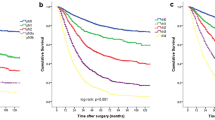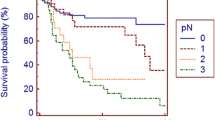Abstract
Background
The lymph node ratio (LNR) and log odds of positive lymph nodes (LODDS) have been proposed to minimize the stage migration phenomenon. The value of the LODDS and LNR staging systems to predict and discriminate prognosis was assessed and compared to the International Union Against Cancer (UICC) TNM classification (pN).
Methods
Three hundred and twenty-six patients with gastric carcinoma were retrospectively studied. Disease-specific survival rates were calculated for every pN, LNR, and LODDS category.
Results
Four LNR categories (0, 1–25, 26–75, and >76 %) and four LODDS categories (−5 to −3, > −3 to −1, > −1 to 3, and >3 to 5) were established. In the multivariate analysis, only the stage pT3-4 versus pT1-2 (HR 1.88, 95 % CI 1.11–3.20, p = 0.02) and LODDS as continuous variable (HR 1.40, 95 % CI 1.21–1.61, p < 0.001) remained as independent prognostic factors. In patients with <16 lymph nodes retrieved, only the LODDS system could discriminate different disease-specific survival curves for every category. LODDS categories were able to discriminate subgroups with different prognoses in pN stages and LNR categories.
Conclusions
The LODDS staging system was superior to the pN classification and LNR system to discriminate risk prognosis especially in patients with an insufficient number of retrieved lymph nodes.



Similar content being viewed by others
References
Maruyama K, Gunven P, Okabayashi K, Sasako M, Kinoshita T. Lymph node metastases of gastric cancer. General pattern in 1931 patients. Ann Surg 1989; 210 (5): 596–602
Siewert JR, Bottcher K, Stein HJ, Roder JD. Relevant prognostic factors in gastric cancer. Ten-year results of the German Gastric Cancer Study. Ann Surg 1998; Vol. 228 (4), 449–461
Kim JP. Surgical Results in Gastric Cancer Semin Surg Oncol 1999; 17:132–138
Cuschieri A, Weeden S, Fielding J J Bancewicz, J Craven, V Joypaul, et al. Patient survival after D1 and D2 resections for gastric cancer: long-term results of the MCR randomized surgical trial. Br J Cancer 1999; 79:1522–1530
Bonenkamp JJ, Hermans J, Sasako M, van de Velde CJH, et al. Extended lymph-node dissection for gastric cancer. N Engl J Med 1999; 340: 908–914
van Cutsem, Dicato M, Geva R, Arber N, Bang Y, Bernson A, et al. The diagnosis and management of gastric cancer: expert discussion and recommendations from the 12th ESMO/World Congress on Gastrointestinal Cancer, Barcelona, 2010. Ann Oncol 2011; 22 (Suppl 5): 1–9
Gastric Cancer. NCCN Clinical Practice Guidelines in Oncology. V1.2013. www.nccn.org
Sobin LH, Gospodarowicz MK, Wittekind C (2009) TNM classification of malignant tumours, 7th edn. Wiley-Blackwell, New York: pp 73–77
Mullaney PJ, Wadley MS, Hyde C, Wyatt J, Lawrence G, Hallissey MT, et al. Appraisal of compliance with the UICC/AJCC staging system in the staging of gastric cancer. Br J Surg 2002; 89: 1405–1408.
Bouvier AM, Haas O, Piard F, Roignot Ph, Bonithon-Kopp C, Faivre J. How many nodes must be examined to accurately stage gastric carcinomas? Results from a population based study. Cancer 2002; 94: 2862–2866.
Smith DD, Schwartz RR, Schwarz RE. Impact of total lymph node count on staging and survival after gastrectomy for gastric cancer: Data from a large US-population database. J Clin Oncol 2005; 23:7114–7124.
Dubecz A, Solymosi N, Schweigert M, Stadlhuber RJ, Peters JH, Ofner D, et al. Time trends and disparities in lymphadenectomy for gastrointestinal cancer in the United States: a population-based analysis of 326,243 patients. J Gastrointest Surg 2013; 17(4):611–619
Inoue K, Nakane Y, Iiyama H, Sato M, Kanbara T, Nakai K, et al. The superiority of ratio-based lymph node staging in gastric carcinoma. Ann Surg Oncol 2002; 9(1):27–34.
Nitti D, Marchet A, Olivieri M, Ambrosi A, Mencarelli R, Belluco C et al. Ratio between metastatic and examined lymph nodes is an independent prognostic factor after D2 resection for gastric cancer: analysis of a large European monoinstitutional experience. Ann Surg Oncol 2003; 10: 1077–1085.
Rodriguez Santiago JM, Munoz E, Marti M, Quintana S, Veloso E, Marco C. Metastatic lymph node ratio as a prognostic factor in gastric cancer. Eur J Surg Oncol 2005; 31:59–66.
Marchet A, Mocellin S, Ambrosi A, Morgagni P, Garcea D, Marrelli D. The ratio between metastatic and examined lymph nodes (N ratio) is an independent prognostic factor in gastric cancer regardless of the type of lymphadenectomy: results from an Italian multicentric study in 1853 patients. Ann Surg 2007; 245(4): 543–52
Wang J, Dang P, Raut CP, Pandalai PK, Maduekwe UN, Rattner DW, et al. Comparison of a lymph node ratio–based staging system with the 7th AJCC system for gastric cancer. Analysis of 18,043 patients from the SEER database. Ann Surg 2012; 255:478–485
Sun Z, Xu Y, Li DM, Wang ZN, Zhu GL, Huang BJ, et al. Log Odds of positive lymph nodes. A novel prognostic indicator superior to the number-based and the ratio-based N category for gastric cancer patients with R0 resection. Cancer 2010; 116:2571–2580
Qiu MZ, Qiu HJ, Wang ZQ, Ren C, Wang DS, Zhang DS, et al. The Tumor-Log Odds of Positive Lymph Nodes-Metastasis Staging System, a Promising New Staging System for Gastric Cancer after D2 Resection in China. PLoS One 2012; 7(2):e31736. doi: 10.1371/journal.pone.0031736
Wang X, Appleby DH, Zhang X, Gan L, Wang JJ, Wan F. Comparison of three lymph node staging schemes for predicting outcome in patients with gastric cancer. Br J Surg 2013; 100(4):505–514
Xu J, Bian Y, Jin X, Cao H. Prognostic assessment of different metastatic lymph node staging methods for gastric cancer after D2 resection. World J Gastroenterol 2013; 19(12): 1975–1983
Liu H, Deng J, Zhang R, Hao X, Jiao X, Liang H. The RML of lymph node metastasis was superior to the LODDS for evaluating the prognosis of gastric cancer. Int J Surg 2013; 11: 419–424
Smith DD, Nelson RA, Schwarz RE. A comparison of five competing lymph node staging schemes in a cohort of resectable gastric cancer patients. Ann Surg Oncol 2014; 21 (3): 875–882.
Roder JD, Bottcher K, Busch R, Wittekind C, Hermanek P, Siewert JR. Classification of regional lymph node metastasis from gastric carcinoma. German Gastric Cancer Study Group. Cancer 1998; 82: 621–631.
Lee HK, Yang HK, Kim WH, Lee KU, Choe KJ, Kim JP. Influence of the number of lymph nodes examined on staging of gastric cancer. Br J Surg 2001; 88(10):1408–1412.
Seevaratnam R, Bocicariu A, Cardoso R, Yohanathan L, Dixon M, Law C, et al. How many lymph nodes should be assessed in patients with gastric cancer? A systematic review. Gastric Cancer 2012; 15 (Suppl 1):S70–S88
Martinez-Ramos D, A. Calero, J. Escrig-Sos, Mingol F, Daroca-Jose JM, Sauri M, Arroyo A, et al. Prognosis for gastric carcinomas with an insufficient number of examined negative lymph nodes Eur J Surg Oncol 2014; 40(3): 358–365.
Ichikura T, Ogawa T, Chochi K, Kawabata T, Sugasawa H, Mochizuki H. Minimum number of lymph nodes that should be examined for the International Union Against Cancer/American Joint Committee on Cancer TNM classification of gastric carcinoma. World J Surg. 2003; 27(3):330–333
Author information
Authors and Affiliations
Corresponding author
Rights and permissions
About this article
Cite this article
Calero, A., Escrig-Sos, J., Mingol, F. et al. Usefulness of the Log Odds of Positive Lymph Nodes to Predict and Discriminate Prognosis in Gastric Carcinomas. J Gastrointest Surg 19, 813–820 (2015). https://doi.org/10.1007/s11605-014-2728-5
Received:
Accepted:
Published:
Issue Date:
DOI: https://doi.org/10.1007/s11605-014-2728-5




